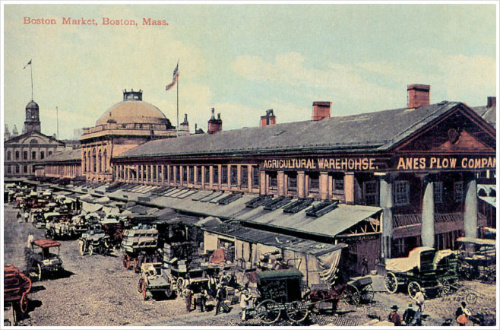My mothers people all went to the states, and my fathers people all... most of them went to the states.9.
-Ray Brooks
While the railway made the community accessible, it also gave people the means to leave. By the time the railway came to town, lot 64 had hit a population peak, and the tide had turned from immigration to emigration. The outward movement was an Island wide phenomenon, and it was actually somewhat late in coming to lot 64; the population of PEI had started to decline in the 1850’s, but in lot 64, it was about 1890 before people started to leave en masse.8. It was little wonder; the land was thoroughly settled by this time, and since farms were already relatively small, further subdividing the land was not an appealing choice. Since farming was still the main occupation at the time, opportunity within the community was limited.
Many left for “the Boston states” (the New England states) to find work and better their conditions. In fact so many Islanders emigrated to the area that it’s hard to find an Islander without family ties in or around Boston even today! Women could find work in the factories or as domestic help, while men could ply their trade or  work in the woods or get into manufacturing. Often, a couple of siblings would travel to the same place, setting out together to try their luck in the States. Some of the oldest Murray Harbour names have spread through the United States this way; a couple of Machons moved to the Boston area (and changed the spelling of their name to Marshon, apparently to sound less French!); a couple of Johnstons (descended from Lelacheurs) moved out to Rhode Island; and a glimpse at the Brehaut family tree finds some of the descendants who were born in PEI in the late 1800’s died in places like Rhode Island, California, Wisconsin, Ohio, and of course, Boston Massachusetts.
work in the woods or get into manufacturing. Often, a couple of siblings would travel to the same place, setting out together to try their luck in the States. Some of the oldest Murray Harbour names have spread through the United States this way; a couple of Machons moved to the Boston area (and changed the spelling of their name to Marshon, apparently to sound less French!); a couple of Johnstons (descended from Lelacheurs) moved out to Rhode Island; and a glimpse at the Brehaut family tree finds some of the descendants who were born in PEI in the late 1800’s died in places like Rhode Island, California, Wisconsin, Ohio, and of course, Boston Massachusetts.
My Uncle Peter, he had a car n'we all thought he was God.9.
-Ray Brooks on relatives "from away"
While migration to the US was common, others spread across Canada. Some left for good, moving out to BC, Alberta, Manitoba, or Saskatchewan in search of good farm land. Others left only temporarily, coming back for certain parts of the year, or after a few years away. Milton Buell of Abney was one of many men who went west in the early 20’s on what was deemed the “harvest excursions”.3. A special train was in service to take east coast workers on a 5 day journey to Winnipeg, where they would disperse and find a farm to work on for the next 5 or 6 weeks during the harvest. This influx of east coasters made up for the shortage of labour out west and gave Maritimers a chance to earn extra cash, check out another part of the world, and have a bit of an adventure. Buell recalled sleeping in tents, barns, and just about anywhere so that he could get work that paid $4 a day. Luckily, that was actually a fairly decent wage for a farmhand then! The situation in the 1920’s isn’t unlike the situation we’re in today; many people still go out west for weeks at a time to work.